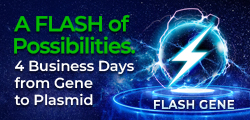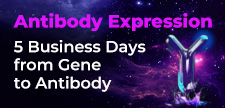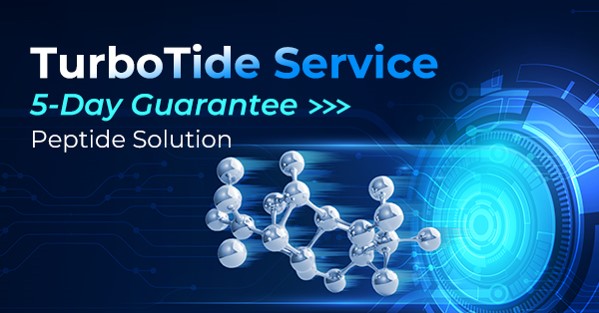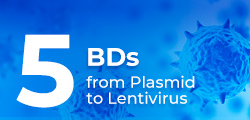-
REAGENT SERVICES
Hot!
-
Most Popular Services
-
Molecular Biology
-
Recombinant Antibody/Protein
-
Reagent Antibody
-
CRISPR Gene Editing
-
DNA Mutant Library
-
IVT RNA and LNP Formulations
-
Oligo Synthesis
-
Peptides
-
Cell Engineering
-
- Gene Synthesis FLASH Gene
- GenBrick™ Up to 200kb
- Gene Fragments Up to 3kb now
- Plasmid DNA Preparation Upgraded
- Cloning and Subcloning
- ORF cDNA Clones
- mRNA Plasmid Solutions New!
- Cell free mRNA Template New!
- AAV Plasmid Solutions New!
- Mutagenesis
- GenCircle™ Double-Stranded DNA New!
- GenSmart™ Online Tools
-
-
PRODUCTS
-
Most Popular Reagents
-
 Instruments
Instruments
-
Antibodies
-
ELISA Kits
-
Protein Electrophoresis and Blotting
-
Protein and Antibody Purification
-
Recombinant Proteins
-
Molecular Biology
-
Stable Cell Lines
-
Cell Isolation and Activation
-
 IVD Raw Materials
IVD Raw Materials
-
 Therapy Applications
Therapy Applications
-
Resources
-
- All Instruments
- Automated Protein and Antibody Purification SystemNew!
- Automated Plasmid MaxiprepHot!
- Automated Plasmid/Protein/Antibody Mini-scale Purification
- eBlot™ Protein Transfer System
- eStain™ Protein Staining System
- eZwest™ Lite Automated Western Blotting Device
- CytoSinct™ 1000 Cell Isolation Instrument
-
- Pharmacokinetics and Immunogenicity ELISA Kits
- Viral Titration QC ELISA Kits
- -- Lentivirus Titer p24 ELISA KitHot!
- -- MuLV Titer p30 ELISA KitNew!
- -- AAV2 and AAVX Titer Capsid ELISA Kits
- Residual Detection ELISA Kits
- -- T7 RNA Polymerase ELISA KitNew!
- -- BSA ELISA Kit, 2G
- -- Cas9 ELISA KitHot!
- -- Protein A ELISA KitHot!
- -- His tagged protein detection & purification
- dsRNA ELISA Kit
- Endonuclease ELISA Kit
- COVID-19 Detection cPass™ Technology Kits
-
- Automated Maxi-Plasmid PurificationHot!
- Automated Mini-Plasmid PurificationNew!
- PCR Reagents
- S.marcescens Nuclease Benz-Neburase™
- DNA Assembly GenBuilder™
- Cas9 / Cas12a / Cas13a Nucleases
- Base and Prime Editing Nucleases
- GMP Cas9 Nucleases
- CRISPR sgRNA Synthesis
- HDR Knock-in Template
- CRISPR Gene Editing Kits and Antibodies
-
![AmMag™ Quatro Automated Plasmid Purification]() AmMag™ Quatro automated plasmid purification
AmMag™ Quatro automated plasmid purification
-
![Anti-Camelid VHH]() MonoRab™ Anti-VHH Antibodies
MonoRab™ Anti-VHH Antibodies
-
![ELISA Kits]() ELISA Kits
ELISA Kits
-
![Precast Gels]() SurePAGE™ Precast Gels
SurePAGE™ Precast Gels
-
![Quatro ProAb Automated Protein and Antibody Purification System]() AmMag™ Quatro ProAb Automated Protein and Antibody Purification System
AmMag™ Quatro ProAb Automated Protein and Antibody Purification System
-
![Target Proteins]() Target Proteins
Target Proteins
-
![AmMag™ Quatro Automated Plasmid Purification]() AmMag™ Quatro automated plasmid purification
AmMag™ Quatro automated plasmid purification
-
![Stable Cell Lines]() Stable Cell Lines
Stable Cell Lines
-
![Cell Isolation and Activation]() Cell Isolation and Activation
Cell Isolation and Activation
-
 IVD Raw Materials
IVD Raw Materials
-
![Quick
Order]() Quick Order
Quick Order
-
![Quick
Order]() Quick Order
Quick Order
- APPLICATIONS
- RESOURCES
- ABOUT US
- SIGN IN My Account SIGN OUT
- REGISTER

![Antibody Drug Discovery Overview Antibody Drug Discovery Overview]()
Antibody Drug Discovery Solutions
Made SimpleResources » Technical Resource Centers » Antibody Drug Discovery Technical Resource » Antibody Drug Discovery Overview
- The History of Antibodies
- Antibody Basics
- Antibody Formats
- Antibody Drug Discovery Overview
- Target Identification and Validation
- Antibody Drug Discovery Webinars
- Protein Webinars
- Hit Generation and Screening
- Lead Selection and Optimization
- Candidate Selection
- Antibody Expression in E.coli
- Transient vs. Stable Expression
- Antibody Expression in Eukaryotic Hosts
Overview
Antibody Drug Discovery Process
The overall discovery process for Ab therapeutics can be broadly divided into five stages:

Target assessment & validation

Screening preparation

Hit generation, screening & lead selection

Lead optimization & characterization

Candidate selection
Often time, screening, hit generation & lead selection are also collectively referred to as "Lead Discovery". Activities leading up to the selection of the clinical candidate are referred to as "preclinical" work/research. While the language and choice of words changes from one publication to another, the concept remains the same.
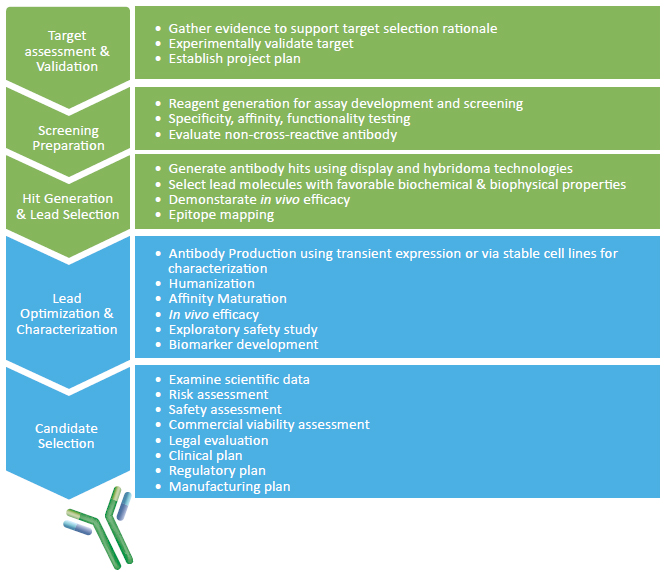
Figure 1: Overview of discovery process for therapeutic antibodies leading to the selection of a clinical candidate is shown in the workflow above. Key activities at each of the five stages are listed in the text boxes.
But How Does One Decide Whether to Pursue Ab or Small Molecule
The answer is that it depends on the target. Small molecules penetrate the cell whereas large molecules (Ab therapeutics) typically target cell surface molecules like receptors or tumor antigens. And hence research will dictate what kind of intervention is required in a particular disease pathway. See major differences between small molecule and large molecule research in the table below.
Table 1: Small molecule drugs vs large molecule drugs.
Small Molecule Drugs Large Molecule Drugs Differences  SmallLarge
SmallLarge Organic or metallic compounds that can bind proteins inside the body thereby altering their function in diseasesBiological molecules (proteins, monoclonal antibodies, vaccines etc.)Produced using synthetic chemistryUsually produced using recombinant DNA technology inside living cellsSmall size <1,000 DaltonsLarge size ~150,000 DaltonsWork inside the cellBind cell surface receptorsLess specificHighly specificEasier to deliver [often oral]Delivery is difficult [usually thorough injection]Relatively cheaper to manufactureManufacturing expensiveEasier to replicate [generics]Difficult to replicate [biosimilars]Example: AspirinExample: Somatropin, hGH, mAb
Organic or metallic compounds that can bind proteins inside the body thereby altering their function in diseasesBiological molecules (proteins, monoclonal antibodies, vaccines etc.)Produced using synthetic chemistryUsually produced using recombinant DNA technology inside living cellsSmall size <1,000 DaltonsLarge size ~150,000 DaltonsWork inside the cellBind cell surface receptorsLess specificHighly specificEasier to deliver [often oral]Delivery is difficult [usually thorough injection]Relatively cheaper to manufactureManufacturing expensiveEasier to replicate [generics]Difficult to replicate [biosimilars]Example: AspirinExample: Somatropin, hGH, mAbThe previous section in this series is "Antibody Formats". To review, Click Here.
Antibody Drug Discovery Resources and Services
Antibody Discovery
GenScript’s Antibody Engineering group can build antibody library with up to 1010 individual clones, to speed up your antibody discovery efforts.
Antibody Sequencing
GenScript’s advanced Antibody Sequencing technology offers fast and professional sequencing services for your monoclonal antibodies.
Assays
GenScript has developed several cell-based ADCC/CDC functional assays to profile the efficacy and potency of your therapeutic antibodies using proprietary recombinant effector cells.
Antibody Engineering
GenScript scientists’ extensive experience in antibody engineering can provide superior services such as antibody humanization, affinity maturation and more.
Antibody Production
With solid expertise in recombinant antibody (rAb) production techniques, GenScript provides a comprehensive rAb service portfolio that deliver microgram to gram quantities of pure rAb for each stage of your Ab drug discovery program.
PK/PD Study
GenScript offers over 120 tumor and inflammation models for evaluation of in vivo efficacy, PK/PD, biomarker and bioanalysis studies. GenScript Anti-idiotype Antibody services are also a powerful tool for antibody drug PK/PD and immunogenicity studies.
You can also view our Recombinant Antibody Service Selection Guide to identify services that are the best match for your application.
Quotations and Ordering
Click the quote button,provide service information and submitOur Technical Account Manager will contact you within 24 hours to finalize quoteYou review and approve final order details and priceYou provide credit card/PO information and order is placedProject is initiated immediatelyOur Project Manager will be in contact with you to provide updatesOur customer service repsentatives are available 24 hours a day, Monday through Friday, to assist you.

-
